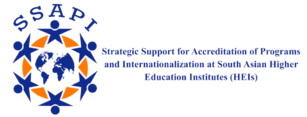This project aims to create learning and practicing opportunities for partner country HEIs staff including administrative staff, faculty, students and researchers. Trainings will focus on learning from EU partners, and developing procedures to modernize the education system. This project will contribute effectively in creating reforms in the overall higher education system of the partner HEIs.
Objectives of the Project
- Capacity building for the development of well-defined and documented policies and procedures in HEIs of partner countries.
- Capacity building for the development and implementation of a mechanism to assess and evaluate various academic activities at the HEIs, in comparison with international best practices and guidelines.
- Providing strategic support in identifying the key areas to focus in each HEI.
- Based on the key focus areas identified for each HEIs, drafting the action plans supporting the processes of quality enhancement in teaching, learning and administration
- Developing a qualifications framework, as per the international standards, by setting out the attributes and abilities that can be expected from the holder of a qualification, i.e. Bachelors, Masters, M. Phil, Doctorate, etc., so that the qualification is recognized and accepted internationally.
- Providing training on reformation of the systems, policies and procedures based
on the key focus areas identified for each HEIs - Establishing sound and sustainable processes and mechanisms to ensure effective management and continuous improvement of teaching and learning
- Developing standardization mechanisms and quality assurance processes and methods of evaluation
- Strengthening the integration of education, research and innovation to achieve long term socio-economic objectives.
Goals of the Project
Phases of the Project
In the first phase, initial preparation of the project, meetings among the partners to assess and evaluate the existing situations, in each partner HEI, and identify the weak areas, along with priority, which needs improvement in each partner HEI will be done.
In order to fulfill established standards in higher education, pursue accreditation of academic programs and to achieve international recognition of its qualifications, all weak areas and bottlenecks will be explored and identified. Based on this exhaustive study and exercise at each partner HEIs, and using the experience of EU partners, some key areas will be targeted as the initial focus areas for each partner country HEI, based on the local needs and priorities.
Training and capacity building of the staff of partner country HEIs will be done in this phase. In the first half of the second phase, one institution for each partner country will be chosen for the implementation of the framework by selection to focus only one of the target areas, and then based on the local experience, the remaining institutions will be targeted in the second half of the second phase and the mechanisms developed and implemented in one HEI of a country will be implemented in other partner countries’ HEIs. During the implementation, regular meetings will be arranged among partners, to discuss the implementation status, effective strategies and well as hurdles and bottlenecks, lessons learned and the guidelines for future work plans and tasks.
In the third phase of the project, the assessment of the initial implementation will be carried out. The performance of HEIs will be measured and improvement will be done where required. Then the cycle of the activities will be done for other target areas, in the partner country HEIs.
Work Packages
Work package 1
Project initiation activities, and assessment and need analysis at each partner HEI
work package 3
Quality Plan for Monitoring and Assessment of Project.
work package 2
Development of Action Plans for each Partner HEI, and Training the Staff.
work package 4
Dissemination and Exploitation of the Project.
work package 5
Overall Management of the Project.
